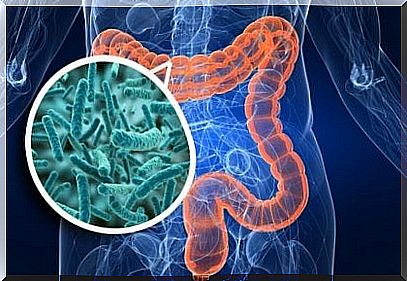Can Intestinal Bacteria Affect Your Emotions?

For centuries we have used the words “Mens sana in corpore sano” (And a healthy mind in a healthy body.) And although the meaning we give it now differs significantly from the original, studies show that a healthy body is the home of a healthy mind, on many different levels. Among the evidence supporting this theory is an important study from the last few years. This study looks at the relationship between gut bacteria, the brain and emotions.
Relatively recently, researchers discovered a surprising relationship between emotions and our gut bacteria. In fact, gut bacteria have become a hot topic for researchers in the last few years.
The close relationship between gut and brain
We are all familiar with the feeling of having butterflies in our stomachs. Recent research has found that there is some truth in that metaphor. Since the beginning of the 21st century, researchers have studied the relationship between the bacteria that live in our gut and mental health.
However, this is not exactly a new area of research. In the early 20th century, doctors and scientists wrote extensively on this subject . They discussed how the contents of the colon, especially the harmful bacteria that live there, could contribute to fatigue, depression and neurosis.

Researchers initially rejected the first studies and hypotheses about the influence of intestinal bacteria on the brain as pseudoscientific . But about 15 years ago, they began to resume the connection between gut and brain. As researchers continue to study this topic, they discover that communication between the brain and the gut is actually a mutual negotiation.
The brain affects immune as well as gastrointestinal functions. These functions can actually change the composition of the intestinal microbiome. Bacteria in the gut also produce neuroactive compounds, neurotransmitters and other metabolites that act on the brain.
In studies in mice, researchers have discovered that some of these compounds can affect the permeability of the blood-brain barrier. This barrier is what prevents harmful substances in the blood from entering the brain.
Intestinal bacteria and mood
Some years ago, the scientific community began to study the concrete effect that gut bacteria could have on emotions. They discovered that the microorganisms in our gut secrete a large number of chemical substances.
Among these are the same substances that our neurons use to communicate and regulate our mood. These include dopamine, serotonin, and gamma-aminobutyric acid (GABA). These drugs appear to play a role in intestinal disorders, which coincide with high levels of major depression and anxiety.
In addition , we have known for some time that a large portion of our neurochemical supply comes from the gut. This is where these chemical signals regulate appetite and feelings of satiety and digestion. However, it was not until a few years ago that research began to take into account the role of microbes in the release of these particular chemical substances.
The importance of brain-gut-microbiota interactions
Recently, researchers at UCLA identified the intestinal microbiota that interacts with the brain areas associated with mood and behavior. This could be the first time that researchers have identified behavioral and neurobiological differences related to the microbial composition of healthy people. Previously, researchers conducted all research in this area on animals.

This study confirms that brain-gut-microbiota interactions may play an important role in our health and behavior. Previous studies suggest that microbiota (microorganisms in the gut) can influence behavior and emotions.
But does the gut affect the brain or the brain on the gut? It is not clear whether the gut has an influence on the brain and its development, or vice versa. Researchers warn that it is difficult to draw causal conclusions because this is a reasonably new field. Most of the major studies on this topic are still ongoing.
The importance of intestinal bacteria
Research on the influence of intestinal bacteria on the brain is currently underway. We have a lot to discover and clarify. So far, the various lines of study have explained the following:
- The intestinal microbiota is a large population that is important for healthy metabolism and brain function.
- The lines of gut-brain communication include neuronal connections.
- Intestinal microbiota is important during early development and can affect the “wiring” of stress circuits in the brain.
- Probiotics or “good bacteria” can have a beneficial effect on mood-related symptoms.
There is no doubt that microbiota plays an important role in our health and our mood. We should think of it as part of a complex and diverse communication system. It is necessary to maintain a healthy balance in the brain. So while we wait for more research to be published, we should take care of our bodies and listen to the messages they send us.









